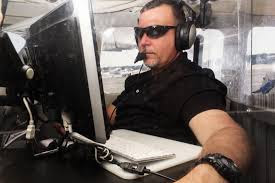 |
| Baltimore from 8000 feet looks innocent enough, but a high res camera can see individual figures (Photo: Bloomberg News) |
What investigator would not want to be able to go back in time like that? Its a dream come true for all detectives who make their living trying to piece things together retrospectively from little snippets left behind, from observations, conclusions and records. Instead of all that deductive work, taking a film that shows what actually happened and run it backwards and forward until all steps are seen, explained and make enough sense to identify the folks who did the crime, who wouldn't prefer that?
But how could such a thing work? Who would have seen everything without knowing what will happen next and where and when? Where would that epic film be that shows everything that has happened in a big city all day long and would allow the detective to simply "spool" it back? Even in Huxley's Brave New World nobody had this particular ability.
But as we know now, thanks to Bloomberg News, all it takes is a contract with Ross McNutt, an unsuspecting Non-Profit that inadvertently channels the money, a donor who is interested in refining the technology ("philantropists" the Bloomberg article calls the donor couple), a Cessna, a couple of pilots who want to get some flying hours down to keep their license active, and a, for once, entrepreneurial police department and, voila!, Baltimore has become Fallujah!
 |
| Persistent Surveillance contractors get a corner at the police headquarters (Photo: Bloomberg News) |
It may seem to some all along that way, but the fact that the technology was refined to be applied in Fallujah for war conditions to track hostile individuals planting IEDs requires special consideration, because it is precisely this genesis which holds the key for judging whether employing a Cessna over Baltimore to create endless film loops is a splendid idea or not.
The system was active for 100 hours in January and February, and then 200 more hours between May and now. McNutt said there is some time left on the contract.
As usual Baltimoreans are split on how serious the matter is. "What's the big deal, I have nothing to hide; if it solves crime, I am all for it" say the ones and "unacceptable, atrocious intrusion in our privacy" say the others.
The police who commissioned the whole thing says sheepishly that it wasn't supposed to be a secret action, although, of course, it was. The aptly named Persistent Surveillance company who offers the technology says that the films are too grainy to show faces or enough detail to identify a car or person. Although night and zoom technology also exists, it didn't get used in Baltimore, or so they say. But secrecy and technological shortcomings are not the real issues here, anyway. What matters is the before-the-act wholesale dragnet type of surveillance (bulk surveillance) doesn't distinguish. Its purpose can be anything, because when you can roll back time, new purposes can come to mind in endless ways. "While we are at it, why don't we also look for xyz", it doesn't take much fantasy to imagine the possibilities of abuse.
This discussion we had already when the country, and indeed the world, discussed Snowden's revelations about eavesdropping on just about every phone call that was made in the entire country and from abroad. We had a thorough debate about bulk surveillance and big data. The arguments then we're the same as now, namely that real eavesdropping would only occur if and when there was a real suspicion and that the resources weren't there to really listen to a lot of stuff. It was determined then, that these lines of reasoning didn't make bulk surveillance right and that wholesale recordation was, indeed, inconsistent with our constitution, a free country because it constituted systemic violation of privacy. The program got scrapped.
 |
| looking not too happy (Baltimore SUN) |
What police was thinking to pull this "21st century investigative tool" (police spokesperson) on the people of Baltimore in a time when trust in police is at a minimum to begin with is everybody's guess. The police sure are slow learners. The program should be scrapped immediately and McNutt sent back to working for the military, in war zones and emergencies. The Mayor who mumbled something about Baltimore being "on the cutting edge of innovation" with this, she needs a "dope slap" for once again not really getting what's going on.
Our future Mayor said she needs more information. Wasn't too much information precisely the issue here?
Our future Mayor said she needs more information. Wasn't too much information precisely the issue here?
There is no evidence in Baltimore's crime rate or poor crime clearance rate that this technology provided a breakthrough. To give the police the intelligence they need takes more than flying a Cessna!


No comments:
Post a Comment